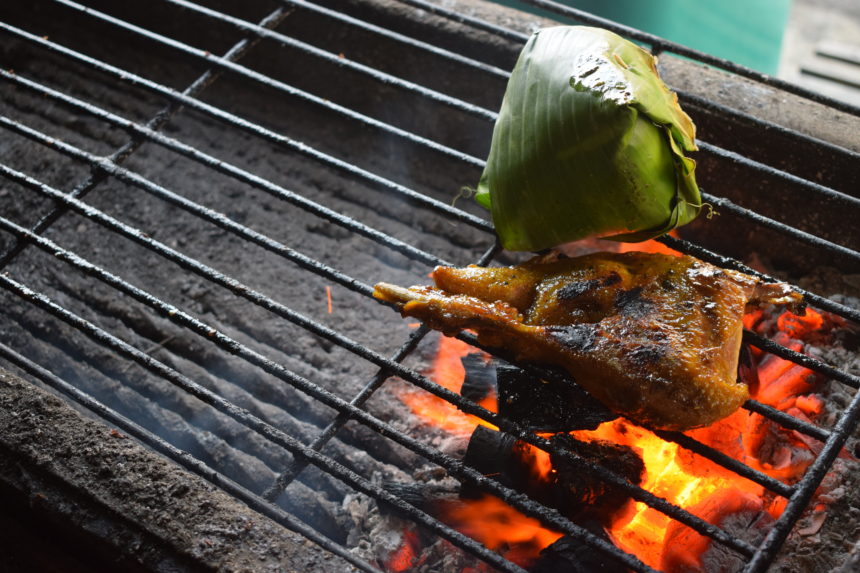
I need to start with a disclaimer before I begin this article – I love duck. Whole roast duck, duck a l’orange, confit duck, Chinese crispy duck: I love it all. Nothing can beat that rich dark meat coupled with melting fat and crispy bits. So when I heard that it would be a good thing to eat in Yogyarkarta, a city in which I had just arrived and knew very little about, we were halfway to the restaurant before you could say ‘quack’.
The restaurant in question was Warung Makan Cak Koting, a small semi-open warung about 20 minutes walk from Malioboro street with decent reviews from locals.
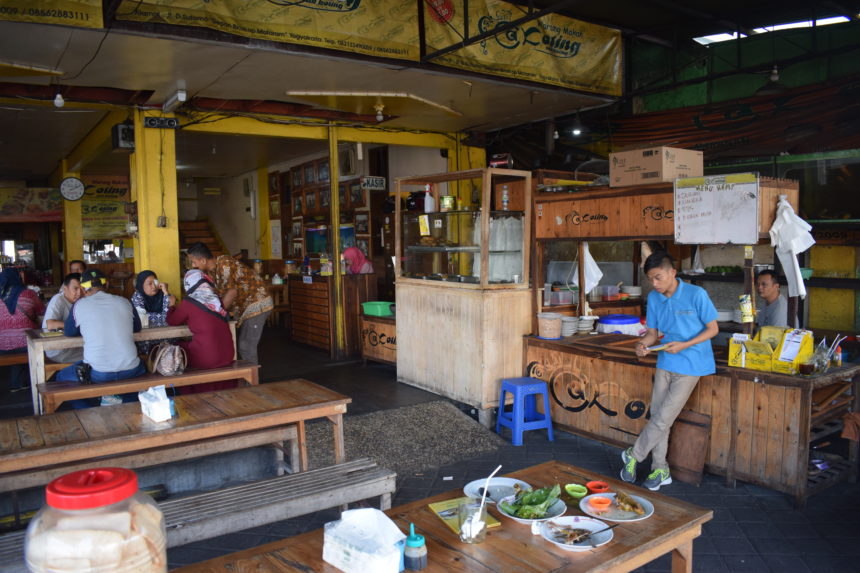
What’s on the Menu?
There were a couple of good universal indicators that the food at Warung Makan Cak Koting was going to please.
Firstly, it was filled with a decent number of locals eating lunch. Second was the small menu size. In my opinion, the best restaurants have a fairly limited offering or, better still, only serve one type of dish. They know what they are good at and they do it well. Makan Cak Koting was no exception – a quick glance at the menu revealed the choice was limited to what type and piece of bird you wanted, and whether you wanted it fried or grilled.
Having already had our fill of the ubiquitous grilled/fried chicken in Indonesia, we both opted for duck – one grilled (bakar), one fried (goreng). We went for leg over breast, as always.
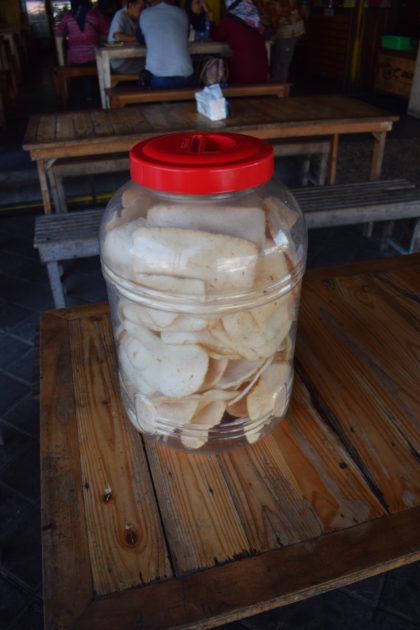
Bebek Goreng (deep-fried duck) – my favourite food to eat in Yogyakarta
The food that arrived was a sight to please fans of crispy duck from across the globe. It was more than good enough to eat on its own.

The thing looked almost beyond crispy. You had to crack it open the skin to get inside. Once you did the meat was steaming hot and, most importantly, moist and rich with rendered duck fat. In each bite you got both the salty crisp of the skin and soft richness of the meat with all the gamey flavours you expect from duck: absolute perfection.
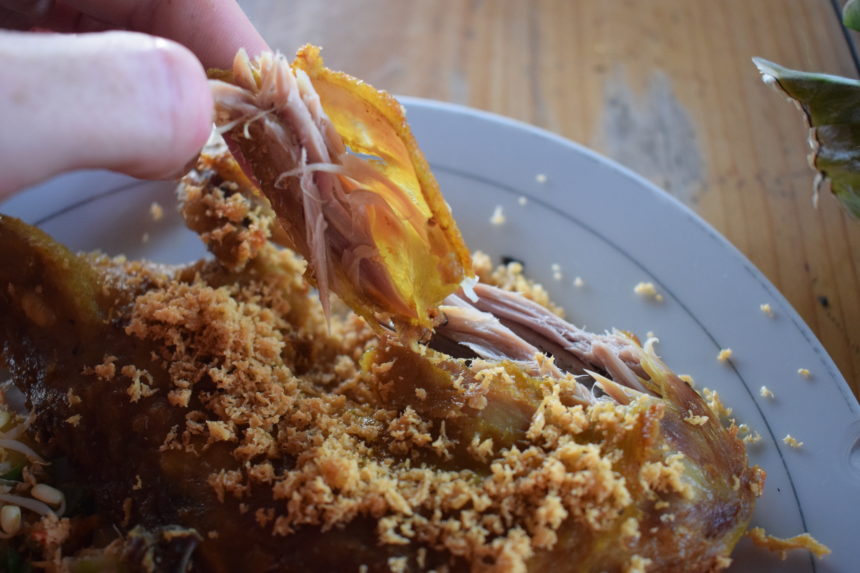
I ended up having quite the revelation in this restaurant. I have always assumed thought nothing would be able to top the richness of confit duck, or the crispness of Peking duck. However, this dish came close to matching both. Perhaps deep-frying (the Indonesian way – without a batter of any sort) is the ultimate way to cook duck? I’m sure that this statement will throw up all sorts of important philosophical questions so I’m just going to leave it for now and say bebek goreng is certainly up there, and at the very least one of the best things you can eat in Yogyakarta. My god it was tasty.
And just in case you weren’t satisfied with the above in terms of crunch levels, Warung Makan Cak Koting also tops your duck with crispy bits known in Bahasa as ‘kremes’.
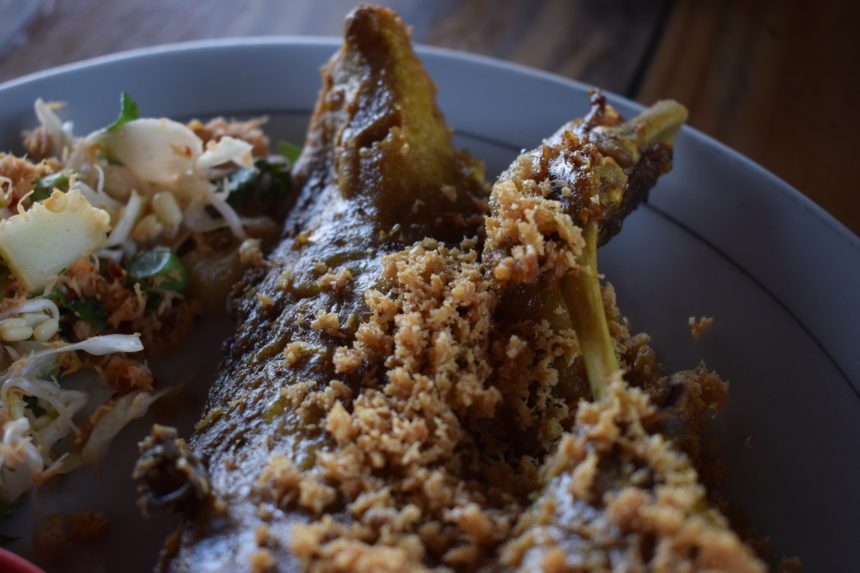
Kremes is basically a finely crumbled deep-fried batter that is a fairly common crispy topping for fried bird across Indonesia, From my experience, the exact texture and flavourings can vary depending on the restaurant/stall. At Makan Cak Koting, the extra flavourings were minimal and so the kremes tasted a bit like very small pieces of crispy potato. This added both seasoning as well as crunch. The end result was quite possibly the crispiest food you can eat in Yogyakarta, and it was no worse for being so.
Bebek Bakar – my 2nd favourite food to eat in Yogyakarta
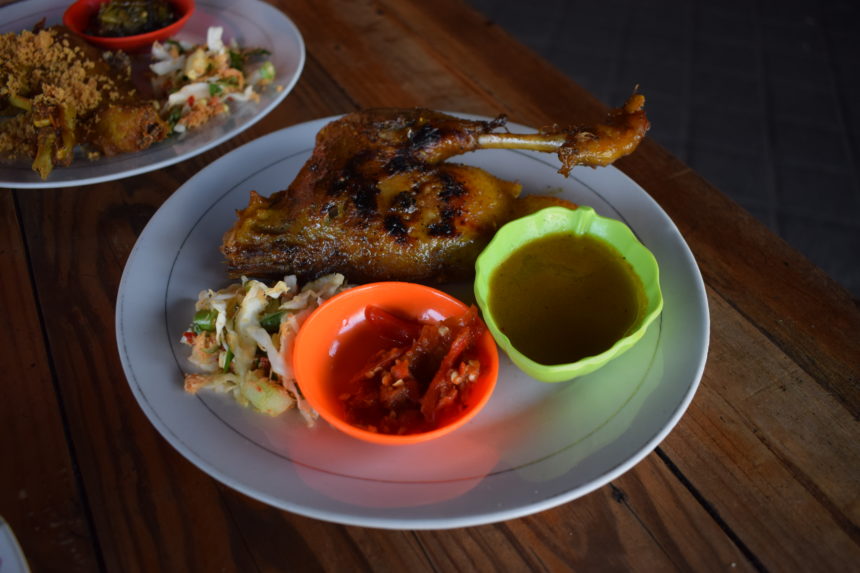
The grilled duck (or bebek bakar) was also very good. Like the bebek goreng, the meat was moist and rich. However there were a couple of additional flavours:
- the smokey taste from the grill. This came from cooking the duck directly over charcoal. This was very nice. However, it did not seem to have quite the same effect you get with grilled chicken (I find that when you BBQ chicken it seems to take on this magical flavour that only chicken can, whereas duck just becomes smoky duck).
- the marinade. This was sweet, salty and peppery – my best guess is as simple as kicap manis and lots of ground pepper. The simplicity was welcome as it allowed the meat and smoky flavours to dominate.
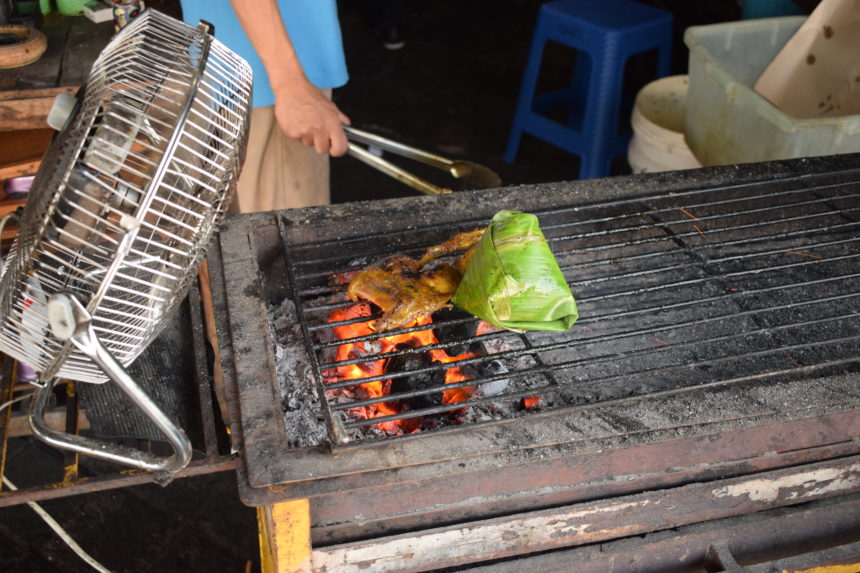
First thing’s first – this was a very tasty piece of duck, and I would have been happy eating it at any stall or restaurant in Yogyakarta, or indeed trying to recreate it at home.
On the other hand, I just couldn’t help but think that the grilled version paled in comparison to the bebek goreng. It just didn’t quite have the same blow-your-mind crispness. The meat too, although still nice and moist, just wasn’t quite as moist (perhaps resulting from the fact that it had been exposed to the hot charcoal for some time instead of being quickly sealed as it fried in hot oil). I don’t want to be negative – this was a delicious dish. Its only downfall was being served alongside one of the best dishes you can eat in Yogyakarta in the form of bebek goreng.
A Dangerous Duo of Sambal
If there is something that can get me as excited as duck, it is sambal. As I write this from Indonesia I can confirm that every meal I am currently eating is accompanied by a small dish of the stuff. I am officially addicted.
As such I have become more particular about the quality of the sambal, which can vary considerably. I’m pleased to report that here at Warung Makan Cak Koting, the sambals were very good. You had a choice of four*, and we ordered two:
*The other two were sambal terasi (fishy) and sambal matang (mature)
1 – sambal ijo – this was a fresh sambal rather than the goreng kind (meaning that the vegetables had been cooked in water rather than fried in oil before being ground). This made it a perfect pairing for the duck in my opinion. It was fresh and spicy enough to cut through the richness of the duck and enhance the taste without competing. Rustically pounded cooked green chillies, salt and a touch of sugar was the most likely recipe.
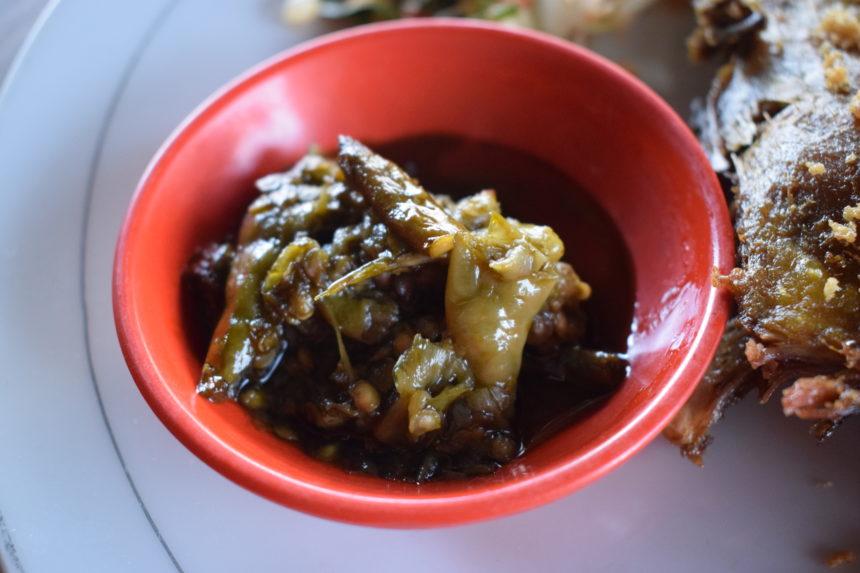
2 – sambal bawang – I had thought ‘bawang’ meant onion, but the primary distinguishing factor here was garlic. Each bite was a delicious hit of raw garlic and fresh heat from the red chilli. Unlike the ijo, the vegetables here had not been cooked at all and so you got the aggressive fresh heat from the chillies and raw garlic flavour. It was one of those addictive sauces that is fearsomely spicy and yet you cannot stop eating because it is so delicious. This time the chillies were red, but just as rustically bashed. The whole thing was probably as simple as: garlic; red chilli; salt; bash; voila.
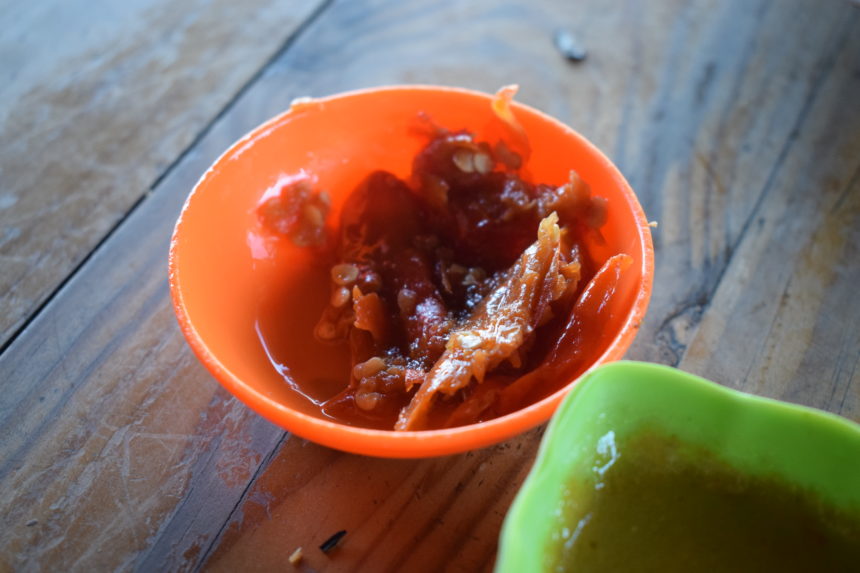
Both sambals were excellent accompaniments to the duck.
In the same way that sourness is often used to cut through fat in Western cooking (e.g. the classic duck a l’orange), the heat from the chillies here was a beautiful contrast that cut through the fattines of the rich duck.
Along with the cooking method, the inspired pairing of these sambals seem to suggest that in Indonesia they know how to get the best out of duck.
Urap – a fragrant Indonesian salad
This was in fact my first time trying urap, an Indonesian salad usually consisting of lightly steamed vegetables and topped with fragrant coconut shreds that have been fried in a spice paste.
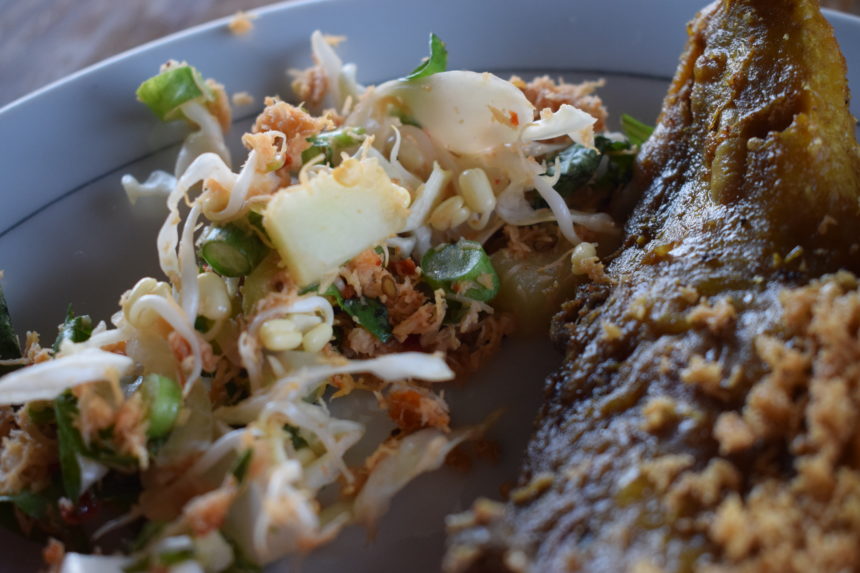
Here the purpose of the urap was clear. It wasn’t a big side dish intended to fill plates and bellies, but a carefully constructed, light and fragrant salad designed to complement the whole plate. Unlike uraps I have subsequently eaten, the vegetables (green cabbage, green bean and beansprout) were raw, providing crunch and freshness. These had been tossed with Thai basil leaves and the coconut mixture – which was strongly flavoured but hard to decipher (likely a combination of lemongrass, turmeric and other aromatics).
Nasi Bakar (grilled rice) – who knew it was possible?
You may have noticed the green parcel sitting next to the duck on the earlier picture of the grill.
Literally meaning ‘grilled rice’, we had to see what nasi bakar was about. My worry was that it would just be a gimmick – an interesting way to present without adding much to the eating experience. I was pleasantly surprised to find this to be wrong.
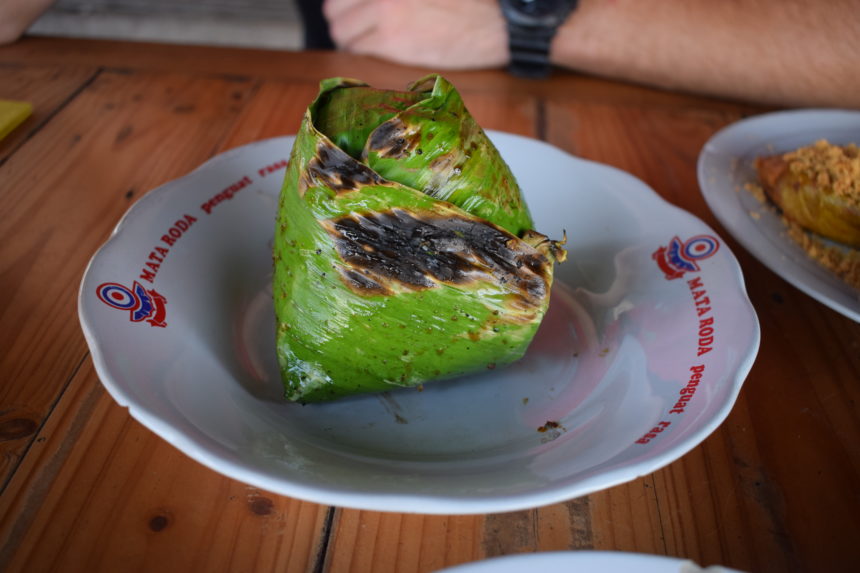
The rice itself was very light and fragrant with coconut, similar to the rice you would find in the Malaysian dish Nasi Lemak. A cube of this rice has been wrapped in banana leaf along with pieces of tempeh and a few stalks of Thai basil. Although as far as I could tell the grill did not directly add flavour to the rice, the perfume from the Thai basil certainly did. Perhaps the grilling in a banana leaf is a rather dramatic way to infuse this flavour, but it worked!
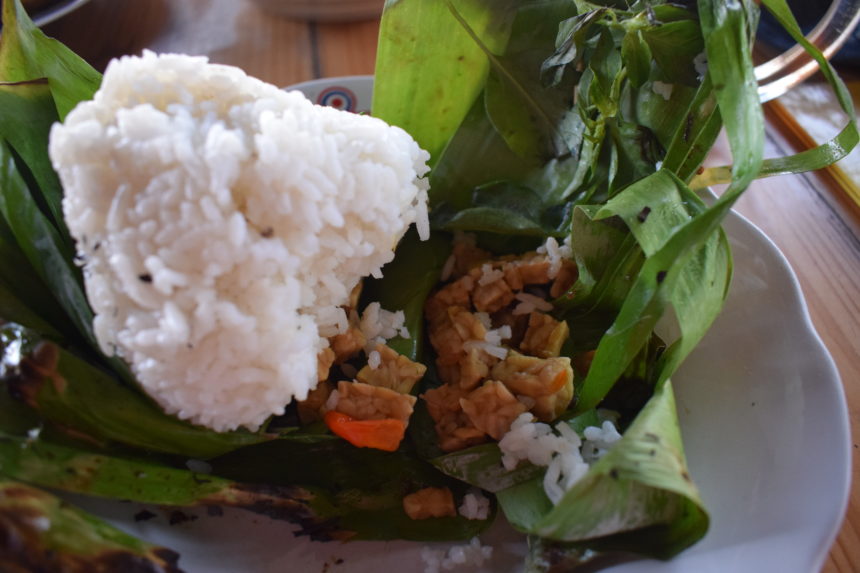
Summary – one of the best places to eat in Yogyakarta?
I’ve said it before and I’ll say it again – the simple things are often the best.
In this case, the combination of beautifully fried duck, fiery sambal and light aromatic urap is an absolute winner and, in my opinion, a must-eat in Yogyakarta. In a country where a large chunk of the population have seemed to master the art of frying chicken, it is not all that surprising that they have also mastered duck. Perhaps we should all be switching from fried chicken to fried duck? Based on this experience, I wouldn’t be complaining if we did.

If you find yourself in Jojga, then treat yourself to some of the best bebek goreng by paying Warung Makan Cak Koting a visit. From a purely food-based point of view, it is probably up there with some of the best restaurants in Yogyakarta.
Prices and location
Price
Total bill = 63,500 IDR (= £3.55 = $4.53)
Bebek goreng – 26,500 IDR
Bebek bakar – 27,500 IDR
Nasi Bakar – 7500 IDR
Teh tawar (Javanese tea without sugar) – 2000 IDR
Location
Address: Jl. Doktor Sutomo No.57, Bausasran, Kec. Danurejan, Kota Yogyakarta, Daerah Istimewa Yogyakarta 55211, Indonesia
Open From: 9AM-11PM